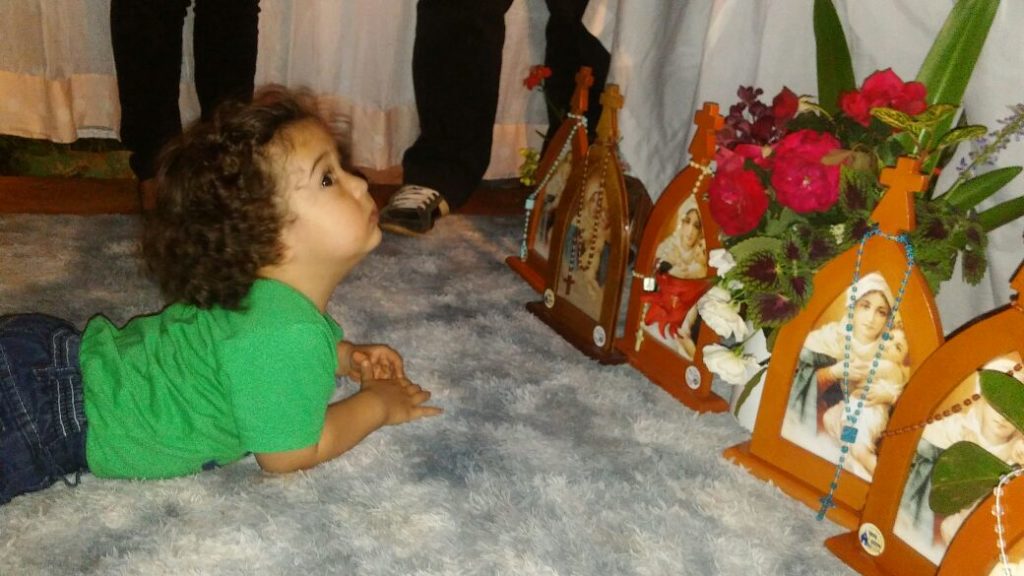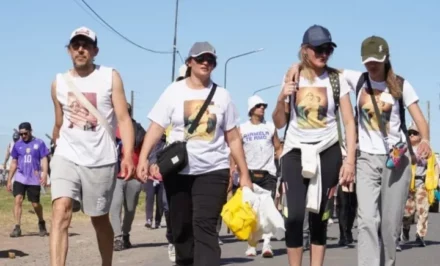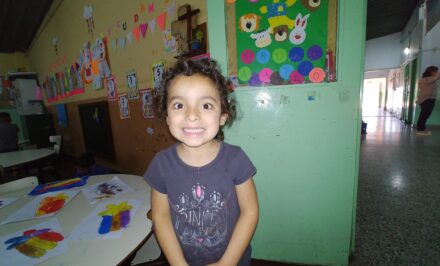FRANCIS EN ASSISI, María Fischer •
It was a quick turnaround plea, as is usual in the digital era, where each item of news, each piece of information, each call is shared within seconds on social networks. Francis is a man of this era, even though his Church is still getting used to the change of time, rhythms and speed. During the Angelus on Sunday, 18 September, Francis called his Church to show solidarity with him and religious leaders around the world in Assisi by praying for peace on Tuesday 20 September. Too short a time for those who only open their emails once a week…or who are too caught up with their own things and don’t have time on their schedules for something that hasn’t been planned well in advance.
But it resonated, even in Schoenstatt. Fr. Rolando Montes, a diocesan priest in Cuba who is currently in Rome wrote an article a short while ago and we started to share his plea…via schoenstatt.org, via email, via Whatsapp.
- “The WhatsApp group in Córdoba, Argentina came up with the idea to pray for peace…13 people prayed the Rosary at 15.00 and another 10 at another time! In just an hour, 23 people came together out of their own initiative to join in covenant solidarity with Francis to pray for peace in the world,” commented Juan Barbosa from Córdoba. “It was a beautiful experience to bring 23 people together in prayer.” Their enthusiasm was greater than ours! (I called them together).”
- “Work schedules meant that I couldn’t go to any Mass at the shrine today, but I told my students (aged between 18 and 20) about the Pope’s visit to Assisi and I asked them to discuss what we can do for peace,” said Nora Pflueger Totti, from La Plata, Argentina. “The words used most frequently were “communication” and “dialogue”and the most urgent was “stop being weaken in ourselves,” and to restore attachments, starting with the people who are closest to us.
- “Here we are” For a few minutes on Sunday, 18 September, messages came through the Whatsapp group for the Memhölz shrine in Germany, saying that people in various cities in Switzerland and Germany were praying with Pope Francis for peace.
- Rolando Montes relates: “At the Spanish College in Rome where I live, we dedicated our lauds and vespers prayers for peace, handing out a prayer that we prayed together at the end. Some of the students prayed the rosary in their free time and offered it up for peace.”
May a new season begin, in which the globalized world can become a family of peoples
“May a new season finally begin, in which the globalized world can become a family of peoples.” – A sentence from the Holy Father’s final message in Assisi. A world that has attachments of solidarity, between governments and their people, between employers and employees, between rich and poor, a culture of encounter, a covenant solidarity that generates solidarity. This is one of the Holy Father’s favourite topics. His message to the Schoenstatt Family during the Jubilee. Gifts are tasks.
Pope Francis makes very concrete suggestions on how to become a “family of peoples.” Works of mercy, practical works of mercy in real life. Communication, sincere dialogue: “Dialogue emerges when I am able to recognize that the other is a gift from God and has something to say to me. Prayer, lots of prayers from so many on the same day, at the same time… be this in the general audiences, in the Angelus, at large meetings, or on days like this when he calls us all to pray for a nation, for a person, for peace.
This is one of my very first memories as a child: The churches were full on 21 August 1968, when the then Czechoslovakia was invaded by the Soviet Union and its allies from the Warsaw Pact. Just 20 years after the end of the Second World War, the unstoppable fear of a Russian invasion spread throughout Germany. I will never forget the Mass at my parish, which was fuller than at Christmas time. I have never forgotten that powerful feeling, that by praying together, we might be able to help the people of Czechoslovakia and stop the Russian troops at the border…Two years later, the lives of three astronauts on Apollo 13 hung on a thread. Thousands of people throughout the world of different faiths lifted up their prayers so that the three astronauts could return home safely. Even today, I feel they are my brothers, “saved by my prayers and those of the whole world.”
We experienced moments like the days of agony and death of St. John Paul II, in the first vigil for peace that Pope Francis called in September 2013, in the prayers in solidarity for Kiki Tagle after her dreadful accident, by Fr. Nicholas and many more, in the prayers of solidarity for the victims of earthquakes, fires, wars…and we do not lose hope that there will be so many of us who have prayed for people of another country or another religion, who are already brothers and sisters…and that all men and women can be a family.
Grant us peace (photo: Amada Girett, Santa Rita, Paraguay)
Pope Francis’ meditation in Assisi
Gathered before Jesus crucified, we hear his words ring out also for us: “I thirst” (Jn 19:28). Thirst, more than hunger, is the greatest need of humanity, and also its greatest suffering. Let us contemplate then the mystery of Almighty God, who in his mercy became poor among men.
What does the Lord thirst for? Certainly for water, that element essential for life. But above all for love, that element no less essential for living. He thirsts to give us the living waters of his love, but also to receive our love. The prophet Jeremiah expressed God’s appreciation of our love: “I remember the devotion of your youth, your love as a bride” (Jer 2:2). But he also gave voice to divine suffering, when ungrateful man abandoned love – it seems as if the Lord is also speaking these words today – “they have forsaken me, the fountain of living waters, and hewed out cisterns for themselves, broken cisterns, that can hold no water” (v. ,13). It is the tragedy of the “withered heart”, of love not requited, a tragedy that unfolds again in the Gospel, when in response to Jesus’ thirst man offers him vinegar, spoiled wine. As the psalmist prophetically lamented: “For my thirst they gave me vinegar to drink” (Ps 69:21).
“Love is not loved”: this reality, according to some accounts, is what upset Saint Francis of Assisi. For love of the suffering Lord, he was not ashamed to cry out and grieve loudly (cf. Fonti Francescane, no. 1413). This same reality must be in our hearts as we contemplate Christ Crucified, he who thirsts for love.
Mother Teresa of Calcutta desired that in the chapel of every community of her sisters the words “I thirst” would be written next to the crucifix. Her response was to quench Jesus’ thirst for love on the Cross through service to the poorest of the poor. The Lord’s thirst is indeed quenched by our compassionate love; he is consoled when, in his name, we bend down to another’s suffering. On the day of judgment they will be called “blessed” who gave drink to those who were thirsty, who offered true gestures of love to those in need: “As you did it to one of the least of these my brethren, you did it to me” (Mt 25:40).
Jesus’ words challenge us, they seek a place in our heart and a response that involves our whole life. In his “I thirst” we can hear the voice of the suffering, the hidden cry of the little innocent ones to whom the light of this world is denied, the sorrowful plea of the poor and those most in need of peace.
The victims of war, which sullies people with hate and the earth with arms, plead for peace; our brothers and sisters, who live under the threat of bombs and are forced to leave their homes into the unknown, stripped of everything, plead for peace. They are all brothers and sisters of the Crucified One, the little ones of his Kingdom, the wounded and parched members of his body. They thirst. But they are frequently given, like Jesus, the bitter vinegar of rejection. Who listens to them? Who bothers responding to them? Far too often they encounter the deafening silence of indifference, the selfishness of those annoyed at being pestered, the coldness of those who silence their cry for help with the same ease with which television channels are changed.
Before Christ Crucified, “the power and wisdom of God” (1 Cor 1:24), we Christians are called to contemplate the mystery of Love not loved and to pour out mercy upon the world. On the cross, the tree of life, evil was transformed into good; we too, as disciples of the Crucified One, are called to be “trees of life” that absorb the contamination of indifference and restore the pure air of love to the world.
From the side of Christ on the Cross water flowed, that symbol of the Spirit who gives life (cf. Jn 19:34); so that from us, his faithful, compassion may flow forth for all who thirst today.
Like Mary by the Cross, may the Lord grant us to be united to him and close to those who suffer. Drawing near to those living as crucified, and strengthened by the love of Jesus Crucified and Risen, may our harmony and communion deepen even more. “For he is our peace” (Eph 2:14), he who came to preach peace to those near and far (cf. v. ,17). May he keep us all in his love and gather us together in unity, that path which we are all on, so that we may be “one” (Jn 17:21) as he desires.















